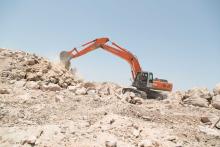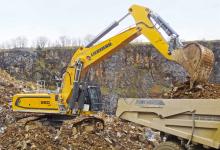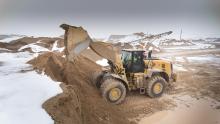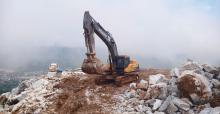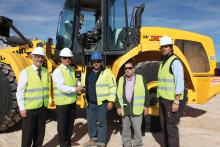A quarry in South Korea is building up its equipment fleet as demand for new roads and other infrastructure linked to the country’s staging of the 2018 Winter Olympics has created huge commercial opportunities for national aggregates sector firms. Guy Woodford reports
A popular South Korean holiday destination thanks to its picturesque landscape, golf courses and woodland, Wonju’s beauty is not just skin deep: the city is part of a region boasting mineral-rich ground and is a haven for extracting granite, and while the coastal part of the region is renowned for its seafood, further inland the landscape is enveloped by dense woodland rich in mineral resources such as iron, coal, limestone and tungsten.
Wonju is the capital city of Gangwon Province, the most north-eastern province of South Korea that straddles the border with North Korea. In 2018, the province will host the Winter Olympics and preparations are already underway to improve Wonju’s infrastructure.
One of the businesses looking to benefit from a wealth of new infrastructure schemes linked to the next Winter Olympics is the Doo Won Development quarry site. There, the quarry management and their team blasts, crushes and mixes granite from the steep mountainous slopes on the outskirts of Wonju to produce crushed aggregate. The aggregate, sized 19mm, 25mm and 40mm, is used in the production of ready-mixed concrete, most destined for government construction projects, including roads and railways.
At Doo Won Development quarry, granite is blasted twice a day and loaded onto four 15tonne trucks by Volvo EC460B and EC480D excavators. The material is then transported initially to a primary crusher and then to a jaw crusher and, finally, a cone crusher, resulting in sand/aggregate fines of 19mm, 25mm, 40mm. The end product is loaded by three Volvo wheeled loaders (Volvo L180 G-series, L150 G-Series, and an L220F-Series) onto 24-27tonne class delivery trucks and mainly distributed to ready-mixed concrete plants, or used in asphalt manufacturing for road construction in South Korea.
The Doo Won quarry site was purchased in 2008 and now employs 55 people, operating a fleet of Volvo Construction Equipment (
Speaking about the daily operation of the site, Kang Peom Hee, the site’s president, said, “Day-to-day operations are handled by the team leader in the field and the operator himself. As director, I do not get involved in these issues. The operator knows the equipment best as he is the one using it day in day out, and our operators are very good at troubleshooting and working together with service technicians to resolve problems.”
Peom Hee said the Volvo L180 G-series wheeled loader used at the quarry came with a fitted with a 5.8m³ rehandling bucket that is optimised in shape and larger than the 4.6m3 general purpose bucket. This, coupled with the boom suspension and rehandling counterweight, provides faster filling times, a higher fill factor and up to 10% improved fuel efficiency.
Eight Volvo excavators ranging from 29 to 48tonnes also feature in the quarry equipment model line-up, handling the large blasted rock inside the quarry. The boulders are loaded onto trucks and transported to the crushing plant. Peom Hee also has
The steep slopes surrounding the Doo Won Development quarry can be difficult to navigate, especially during the snowy winter months, but Peom Hee is pleased with his fleet’s performance throughout the year. “During the winter, we sometimes face problems with our conveyor belt seizing up – but our construction equipment keeps on running. We experience impressive uptime with our Volvo machines – they’re very reliable and we get great support from our local dealer,” said Peom Hee.
The local Volvo CE dealer is situated just a stone’s throw from the site and offers Doo Won Development on-site service and maintenance support, as well as spare parts. “For me, the most important factor when buying machinery is the relationship I have with the local branch,” Peom Hee continues. “I’m satisfied with the support we receive – and even Volvo’s international call centre regularly contacts me to ensure we’re happy with everything, while the local technicians come to our site to check the equipment.”
Thanks to the CareTrack telematics system, the Wonju-based Volvo CE branch has access to the fleet’s machine data in order to remotely monitor service intervals and fault alarms, so a technician can be available to immediately deal with a problem or service issue. “The service checks are always carried out on time,” said Peom Hee. “In comparison to other equipment we’ve used, Volvo machines have virtually no downtime.”
Seo Jong San has operated wheeled loaders for over 21 years, and currently operates an L220F at the Doo Won Wonju site. “The axle and other driving components last very well. But most impressive is the machine’s fuel consumption, which is up to six litres per hour lower than other brands, depending on the application,” he said. For Doo Won Development, the maths are said to be simple when comparing Volvo CE to other brands.
Experienced machine operator Jong San operates the wheeled loader for 10 hours a day all year round and says he also appreciates the additional finishing touches that Volvo CE adds inside its cab to keep operators comfortable. “I find the Volvo machines comfortable and stable to operate – which makes it a more enjoyable ride for me.”
The Doo Won Development has a target of producing 1.1 million m³ of crushed aggregate during 2014 – a 10% increase from 2013. Peom Hee also believes an annual 5-10% production volume rise is also achievable in the years 2015-18. With production continuing to ramp up, the president plans to purchase more equipment for his site. “I’m very happy with the support I receive from Volvo CE, and I see our relationship continuing long into the future thanks to the equipment’s high resale value and uptime,” said Peom Hee.
“Doo Won Development is trying to improve the work efficiency and operating costs by replacing old small trucks with Volvo articulated haulers. It also plans to purchase an additional Volvo EC290 excavator, and one Volvo L180F wheeled loader by April next year to help with field operations and site preparation. The company is also dedicated to developing its local community and has donated more than 20 million (US$19,400) to Wonju local projects.”
Volvo CE’s L180F wheeled loader
The Volvo L180F wheeled loader due to be deployed at Doo Won Development’s Wonju quarry from next spring is said by Volvo CE to have the power and manoeuvrability needed to take on and quickly handle demanding applications in rock, hard bank, and log handling.
Fitted with a fuel efficient Volvo V-ACT D12E, Tier 3/Stage IIIA engine and a 4.6m³ general purpose bucket, the model is said to offer tremendous power and impressive low-end torque, while also providing owners with outstanding fuel economy, high reliability, and durability with low levels of noise and exhaust emissions.
Volvo’s innovative lift arm system TP-linkage gives the L180F optimal breakout torque and claimed outstanding parallel movement throughout the entire lifting range. The operator also has good control of heavy loads, optimised attachment visibility and great rollback angles.
Other key benefits of the model include an in-built Fuel-saving Automatic Power Shift (APS), said to select the right gear for the job and current operating conditions. A long wheelbase is also said to enable the L180F to ride smoothly and comfortably on rough ground. Finally, an optional Boom Suspension System (BSS) is claimed to increase productivity by up to 20%.

